The ongoing drama over Adolf Hitler’s birth house in Braunau-am-Inn, Austria, has entered a new phase with the news that the ex-owner, Gerlinde Pommer, has launched an appeal in Austria’s Constitutional Court to rule against the government for expropriating the building.
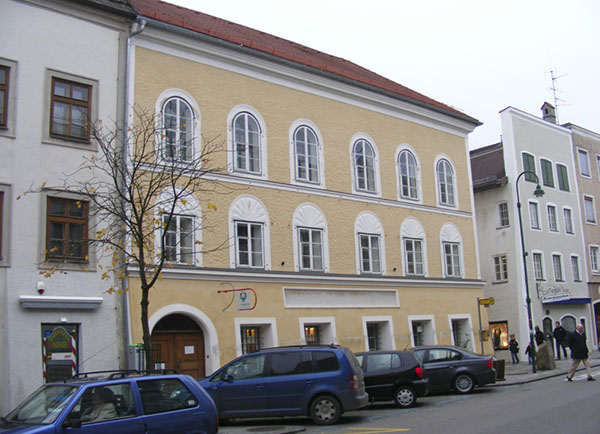
The Austrian government seized the building in December 2016, after forcing through a special expropriation law specifically aimed at the property.
Pommer’s family has owned the 8,600-feet building at 15 Salzburger Vorstadt Street, located right in Braunau’s historic center, since 1912.
It was in a room on the first floor of the three-story house—the ground floor of which was a restaurant—that Hitler’s mother Klara gave birth to her famous son on April 20, 1889.
At the time of his birth, the building was a modest guest house, where his parents rented rooms in connection with his father’s job as a minor customs official at the nearby Austrian–German border.
The Hitlers lived in the building only until Adolf was three years old, when his father was transferred to Passau.
In October 1933, the owner of the building, Josef Pommer, was officially cautioned by an Austrian court because his restaurant, called the Gasthof Zum Pommer, had become a regular meeting place for National Socialists after that party had been officially banned by the government.
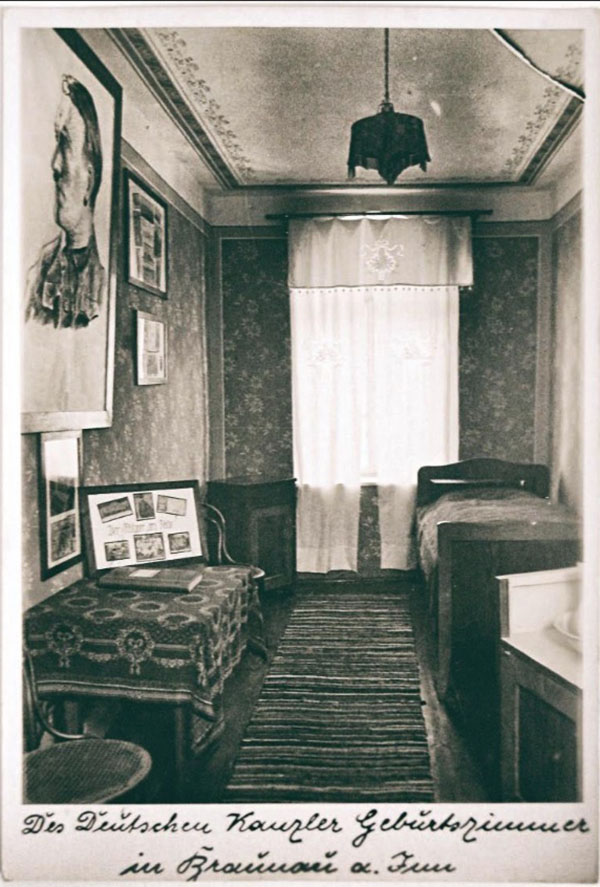
At the same time, Pommer’s son, Josef junior, was fined after being arrested distributing NSDAP propaganda in the town.
Pommer senior also converted the young Hitler’s bedroom into a mini-museum, and offered tours to interested parties from as early as 1936.
After Austria’s Anschluss in 1938, the building was declared a national monument, and NSDAP party secretary Martin Bormann purchased the house from the Pommer family for 150,000 Reichmarks—an extraordinary sum for the time.
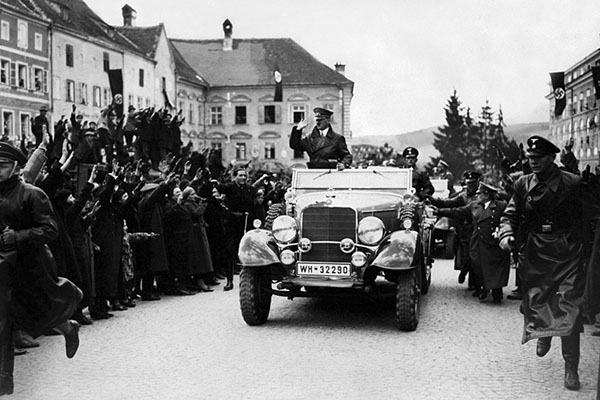
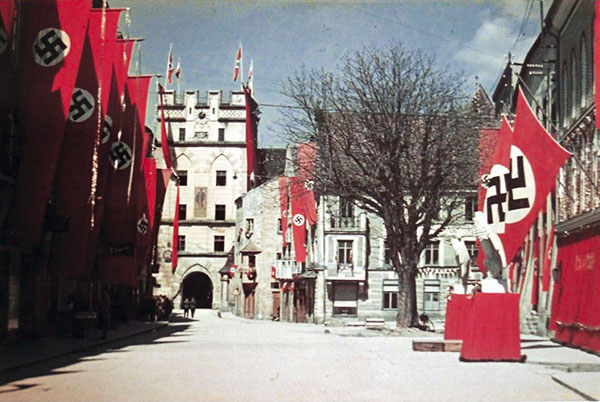
Bormann installed a metal gate, replete with his initials “M.B.” over the front door—a relic which can still be seen at the present day. Under Bormann’s ownership, the building served as a cultural center—which displayed German art—and a library.
At that time, a plaster inscription was placed across the front of the building which read Volksbücherei Braunau (“People’s Library Braunau”). This inscription can still be faintly seen today.
Josef Pommer senior died in 1943, and his funeral was attended by large crowds from the local NSDAP party branch and the local fire service.
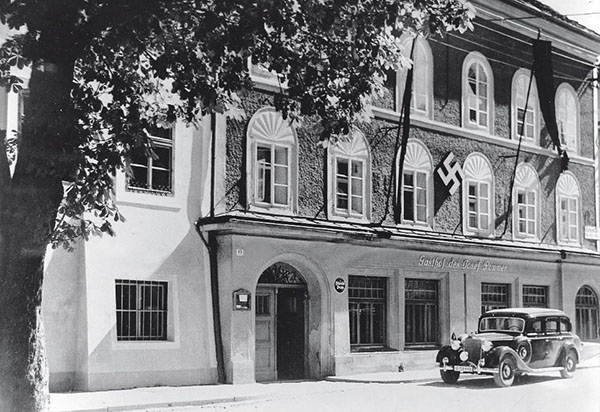
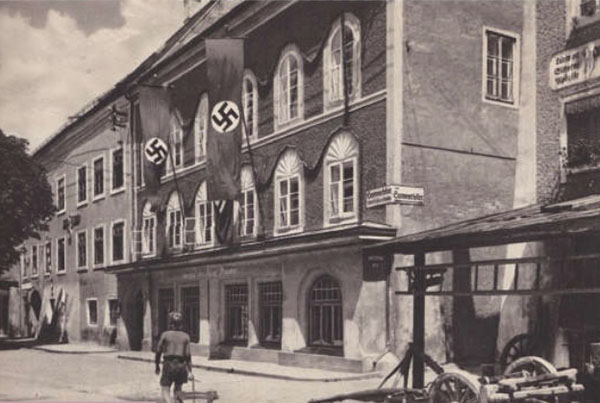
The building survived the war undamaged, and was seized by the American army after it occupied the town on February 7, 1945.
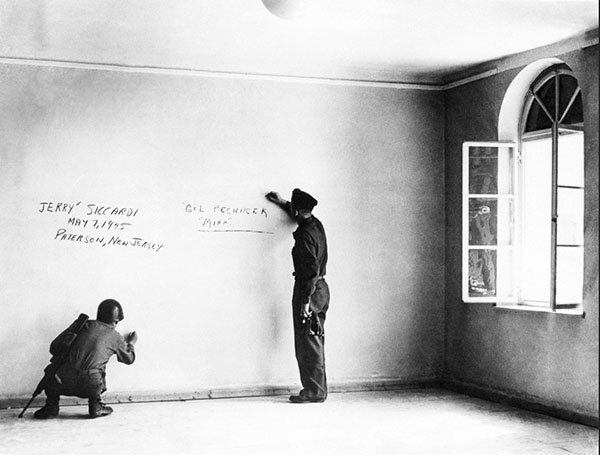
The next year, the American military government appointed the bank of Upper Austria and Salzburg to maintain the house, but by 1947, responsibility for the house was turned over to the municipality of Braunau.
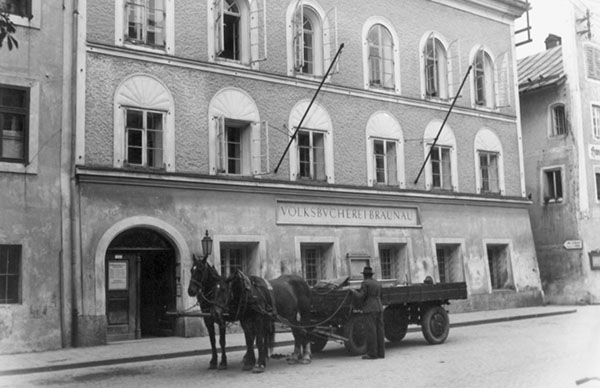
In 1947, Josef Pommer’s widow, Maria, sued for restitution of the house. Maria however died in 1948 before the court case was completed, and it was up to her daughter, Kreszenzia, to continue with the claim.
Finally, Kreszenzia recovered the house by paying 150,000 schillings to the government—but only after her brother, Josef junior, gave up any claim to the house. This was a stipulation based on the government’s fear that Josef junior would use the house to somehow promote National Socialism once again.
In the 1950s, the municipality of Braunau rented the house from Kreszenzia in order to accommodate high school classes. After that, the council continued with its lease, converting the building back into its previous use as a city library.
Once the library moved out, a local bank rented the building.
Finally, in 1971—after several claims that Hitler supporters were trying to buy the house, the central Austrian government signed a rental agreement with Kreszenzia, agreeing to indefinitely lease the building.
The lease which was signed stipulated that the building could only be used for “educational, social, or bureaucratic purposes” and that the building was never to be adorned with any visible political statement.
For several years thereafter, the technical high school of Braunau was housed in the building. In 1976, the Lebenshilfe Oberösterreich, an Austrian charity for the disabled, started using the house as a daycare center.
By 1983, increasing numbers of tourists to the house had alarmed authorities to the point where they decided to install a plaque on the house walls condemning Hitler.
By now, ownership of the house had passed to Gerlinde Pommer—and she refused to let the government attach any such plaque to the building, pointing out that the terms of the original rental contract specifically forbade it.
After a court ruled in her favor, the authorities were forced to erect their anti-Hitler memorial on the sidewalk outside the front of the house, where it still blocks passing pedestrian traffic.
Gerlinde Pommer also owns the property behind the Hitler house, the garage parking spaces, the parking lots, and one half of the house next door.
In 2011, however, the Lebenshilfe Oberösterreich moved out to new premises, and the building has stood vacant ever since—even though the lease with Gerlinde continued.
In early 2015, the Austrian government made an offer to purchase the house outright, indicating that the government would investigate options for seizing it if she refused.
Government spokesmen declared their intent to raze the house completely so as to prevent the ever-increasing flows of tourists to Braunau.
Finally, after nearly two years of further inaction, the special appropriation law was passed and the house was seized.
To everyone’s surprise, the government then announced that instead of tearing down the building, it would actually be renovated and used for a mental health charity.
Now however, these plans are once again on hold as Gerlinde’s lawyers have argued that the expropriation legislation is unconstitutional.
Pommer’s lawyer has already announced that they will take the case to the European Court of Human Rights in Strasbourg if Austrian judges rule in favor of the government.
“To put it bluntly, the standard legal requirements for an expropriation are missing,” her lawyer Gerhard Lebitsch told Austrian newspaper the Kurier.
The drama over Hitler’s house is therefore set to play out for at least another few years before its fate is finally decided—but no matter what happens, Braunau’s most famous son will still loom large over the town.
 Recommended reading: Germany’s Hitler: The Only Authorized Biography
Recommended reading: Germany’s Hitler: The Only Authorized Biography
By Heinz A. Heinz. One of the most suppressed English-language books ever to emerge from Germany: the 1938 authorized biography of Adolf Hitler.
The professional journalist/author interviewed Hitler’s old school friends, army colleagues, landlords, his jailer and early party comrades to provide an unprecedented insight into the German leader’s background and prewar policies.
Included are vivid and unique descriptions of Hitler at school, his First World War battlefield experiences, early politics, the amazing truth behind the November 9th Putsch, Hitler in prison, and the struggle to power from 1926 to 1933.
It ends just after the Austrian Anschluss and the end of the Czech/Sudeten crisis. This book was the foremost Hitler myth-buster of its day, and is full of personal and political insights. Read, for example, about the handicapped child who was amazed to find the Reichschancellor personally deliver his Christmas present; how Hitler always refused to take his salary and instead ordered the state treasury to divert it to relief work for the poor, and of the massive social reforms that boosted German living standards to the best in Europe.
This work is vital for anyone interested in understanding why Hitler won the total adulation and support of the German people and how he was able to turn around a destitute nation in just a few short years.
Get the details here.